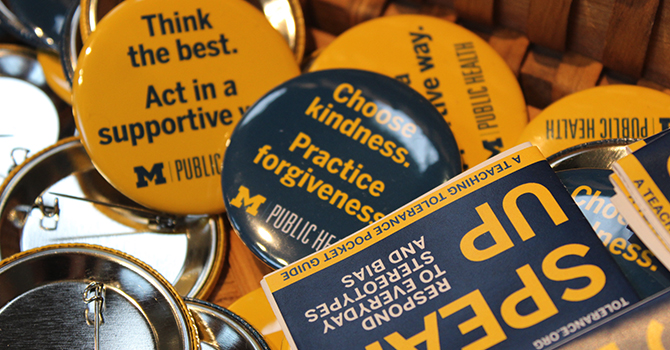The Role of Diversity, Equity, and Inclusion in Public Health

Katrina Burns
PhD Candidate, Environmental Health Sciences
At the beginning of 2018, United Nations Secretary-General António Guterres eloquently expressed his urgent concerns for peace and discussed how inequalities severely impact health and safety around the world. His message is a call to leaders all over the world to unify and address these issues for positive change.
Even if there is not a platform for an issue to be discussed, it is good to know that I am studying at a university that will give the space needed to address issues of concern or an overlooked population, no matter how small.
His message touched me deeply, as he adequately describes the mission of public health around local and global diversity, equity, and inclusion issues.
Here at the University of Michigan, President Mark Schlissel has taken the lead with the implementation of a university-wide focus on Diversity, Equity, and Inclusion (DE&I). The University of Michigan has the right formula to make this work well: leadership support coupled with proactive faculty, staff, and students who want to support DE&I efforts.
There is always work to be done, but every day I see the university changing in very positive ways. Even if there is not a platform for an issue to be discussed, it is good to know that I am studying at a university that will give the space needed to address issues of concern or an overlooked population, no matter how small. I think that is the strength of this institution.
The School of Public Health has responded by mobilizing all departments to carry out this mission.
Faculty and students at the school are addressing issues like climate change, poverty, health and education disparities, and occupational exposures that disproportionately affect communities of color and low socioeconomic status. My colleagues have even addressed gun violence issues and their relation to public health—something the CDC recently shied away from due to political pressure.
The School of Public Health is not only demonstrating the growing influence around DE&I but has placed its signature on the tremendous impact it will have on the local community and around the world. In the Environmental Health Sciences department, the supportive leadership of Dana Dolinoy, NSF International Chair of Environmental Health Sciences; our interactions with one another; and the research we do speaks to our commitment to DE&I. We have the intellectual space to pursue our research but also to make a positive impact on the world and society around us.
If a space is needed to address concerns and it does not exist, someone will come forward to speak to the cause. For example, Marie O'Neill, professor of Environmental Health Sciences and Epidemiology, works on community based participatory research (CBPR) in Detroit—specifically, the Housing, Heatwaves, and Health (3H) study that examines the impact of heatwaves with a simultaneous blackout on the residents of the city of Detroit. This research not only engages directly with communities of color to learn about their individual concerns, but empowers community partners to be involved in the research, give presentations, co-author papers, and take initiatives to seek out grant funding opportunities and continue to build and strengthen collaborations to support the educational, social, and financial needs of their communities in the context of climate change. The team also strives to engage policy makers to ensure that no one is left behind during emergency preparedness.
Ultimately, DE&I is at the core of public health work.
Richard Neitzel, associate professor and associate chair of Environmental Health Sciences, and his team has traveled to Ghana, Chile, and Thailand to work with communities and determine how to improve worker health in informal e-waste streams. The global impact of this work is remarkable, as he and his colleagues gather evidence to appeal for change in how we handle our own e-waste in developed countries to reverse the negative impacts of informal e-waste recycling in low- and middle-income countries. He is also interested in identifying sustainable and inclusive solutions for e-waste recycling communities to allow them to reap the economic benefits of e-waste recycling.
In my own research on laboratory safety, I have the opportunity to work on issues that will help improve not only compliance but also the safety culture in research laboratories, including focusing on vulnerable populations to increase safety self-awareness in the laboratory environment.
Finally, I have had the wonderful opportunity to work with brilliant and dedicated students, staff, and faculty in our department to build the Environmental Health Sciences DE&I committee. Fellow PhD students Aubrey Langeland, Chad Milando, and Max Aung and master's students Kyle Sullivan and Lauren Smith are individuals I hope everyone will get a chance to meet before they graduate. Another brilliant PhD student, Chanese Forte, is working diligently with master's student Andrea Cruz to build support for the LGBTQIA community at the School of Public Health.
Ultimately, DE&I is at the core of public health work. They are interconnected and we cannot have one without the other. I feel fortunate to be surrounded by mentors and colleagues at Michigan Public Health who not only understand this but are truly driven by the pursuit of DE&I each and every day.
About the Author
Katrina Burns is a third year doctoral candidate in Environmental Health Sciences
at the University of Michigan School of Public Health. She has a bachelor's degree
in microbiology, training in molecular biotechnology, and a certification in clinical
molecular biology. She also has master's degrees in education, bioethics, and public
health with additional certifications in bioethics mediation, bioethics consultation
and research ethics (pending). Before returning to school to pursue an advanced degree,
Burns worked as a microbiologist and a laboratory manager for more than 17 years.
In 2018, Burns was the very first student recipient of Michigan Public Health's Eugene
Feingold Excellence in Diversity Award.
Marie O'Neill is her dissertation chairperson and last year's recipient of the Eugene Feingold Award. Richard Neitzel is her dissertation co-chair.
